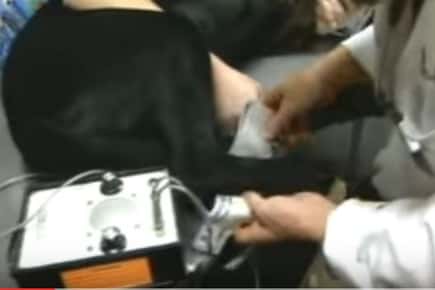
Most dog owners would admit a lack of knowledge or perhaps even a lack of concern about canine hypertension, or high blood pressure in dogs. After all, since they don't have the same vices as we do, they shouldn't be at risk, right? Well, the answer may be a little more complex than just life style choices.
One study showed that 93% of dogs with chronic kidney disease also suffer from high blood pressure. Other studies cite that more than 60% of geriatric dogs (over 8 years old) also suffer from this often silent disease. One reason that so little is known about how many dogs are actually affected is the fact that blood pressure measurements are not routine during your pet's office visit. Considered to be one of five vital signs for humans, blood pressure in our pets has not received the same attention and thus, inconsistent measuring practices and varying guidelines have made it difficult to determine what values are currently accepted as borderline or mild hypertension in pets.
Blood pressure in humans is measured by gently occluding, or blocking, an artery in an arm or leg. A stethoscope is then used to listen for the return of the pulse as the pressure is slowly released. This point is known as the systolic blood pressure, or the higher of the two numbers you will hear or read. Next, the pressure continues to be released and when no pulse sounds are heard, that pressure is called the diastolic pressure. Blood pressure is then read as systolic over diastolic, or, for example, 140 over 80. For dogs, the stethoscope is often not sensitive enough to hear the pulse sounds and it is virtually impossible to detect the diastolic signal. Most veterinarians will simply record a pet's blood pressure as the systolic measurement, or, for example, 180. Many veterinarians who utilize blood pressure measurements use an ultrasonic probe to "hear" when the pulse returns to the artery. The probe will then convert that signal into an audible sound for the doctor. Experts caution both veterinarians and owners to never become alarmed at a single high reading. The important thing to remember is that the results must be repeatable.
Dogs often suffer from secondary hypertension, or high blood pressure due to some underlying disease process. The most common canine diseases that can lead to high blood pressure are chronic kidney disease, Cushing's disease (an overproduction of cortisone by the body), and adrenal gland tumors. With high blood pressure, blood vessels can become thickened and stretched and may eventually rip and tear, causing bleeding. This may not be immediately noticeable, but as small vessels in the eye and in the kidneys begin to be destroyed, patients will begin to show clinical signs. Symptoms of high blood pressure are often unnoticed by the owner. A sudden or gradual onset of blindness can be the only outward sign that your pet may have high blood pressure. High blood pressure can worsen existing kidney disease, can cause bleeding in the brain, and will eventually affect every organ in the body.
Fortunately for our pets, since high blood pressure often results from another disease process, controlling the first disease will often reverse or help to control the high blood pressure. As with humans, certain drugs are available to help relax and dilate blood vessels, lessening the pressure from the blood flow. In addition, routine blood screening and routine blood pressure measurements will become vitally important to the health of your pet.
Hypertension in Dogs
- Symptoms of high blood pressure are often silent, but a common sign in dogs is a gradual, or sudden, onset of blindness due to blood vessel tears within the retina.
- Treating the high blood pressure requires that the underlying disease be identified and treated.
- After treatment, animals often resolve their high blood pressure issues.
- In case the high blood pressure cannot be resolved, medications, such as ACE inhibitors, calcium channel blockers, and vessel dilators can be used with varying degrees of success. The success depends on the individual and the species of animal involved.
- Measurement of dog's blood pressure is an inexact science. Most veterinarians will utilize a Doppler Blood Pressure Monitor. This device uses an ultrasonic probe to translate the barely audible systolic signal into an audible tone for the doctor to hear.
- Due to a lack of adequate numbers of patients studied, the definition of mild hypertension or borderline hypertension has never been fully described.
- Additionally, the stress factor of visiting the veterinarian can cause an animal's blood pressure to rise to a point considered to be hypertensive.
